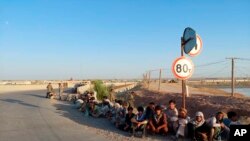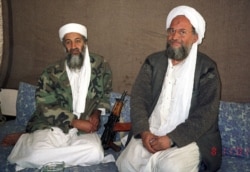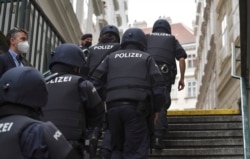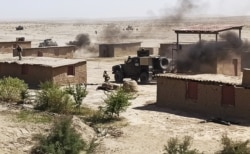On August 3, Zamir Kabulov, Russia’s presidential envoy to Afghanistan, claimed that the Taliban’s victories in the embattled country’s north did not pose a terror threat to Central Asia.
Kabulov made those remarks at a forum on public diplomacy in Moscow as the Taliban gains ground against Afghan government forces after U.S. troop withdrawals. Last week the militant Islamists captured Zaranj, the capital of Nimruz Province, Sheberghan, capital of Jowzjan province, and on Sunday, August 8, two more provincial capitals: Kunduz and Taleqan.
The Taliban has also taken control over Afghanistan’s borders with Tajikistan and Turkmenistan, both of them former Soviet republics in Central Asia in which Russia maintains a military presence.
Commenting on Taliban advances, Kabulov claimed the group has no ties with any terrorist organizations, including Islamic State and al-Qaida. He said there was “not a single fact” in Taliban history showing the group posed a threat to Central Asia.
Without evidence, he also claimed that the U.S. and the Afghan government invented a connection between the Taliban and al-Qaida to justify heavy combat losses.
“Ties between the Taliban and al-Qaida are bogus,” Kabulov said. “The only ones talking about [such ties] are the government in Kabul and the Americans.”
That is false.
In fact, the Taliban has a longstanding relationship with al-Qaida. It has been noted not only by the United States and Afghan government, but by the United Nations, European Union and Russia itself, as expressed recently by the country’s top defense official.
The U.N. Security Council has a special team that monitors terrorist threats and provides annual situation reports. Its latest publicly available report, from May 2020, confirmed the Taliban’s alliance with al-Qaida.
“Relations between the Taliban and Al-Qaida remain close, based on friendship, a history of shared struggle, ideological sympathy and intermarriage,” the report stated.
“The senior leadership of Al-Qaida remains present in Afghanistan, as well as hundreds of armed operatives, Al-Qaida in the Indian Subcontinent, and groups of foreign terrorist fighters aligned with the Taliban. A number of significant Al-Qaida figures were killed in Afghanistan during the reporting period.”
“The Taliban regularly consulted with Al-Qaida during negotiations with the United States and offered guarantees that it would honor their historical ties,” the report said.
The European Union’s security agency, Europol, stated in its most recent annual terrorism report that, three EU member states – Austria, France, and Germany – saw 10 jihadist attacks in 2020 that killed 12 people and injured more than 42.
The majority of these attacks in the EU were incited by al-Qaida propaganda, the Europol report said, and the group has “continued to pursue its strategy to embed itself in local conflicts,” with most affiliates in its global network reiterating allegiance to the al-Qaida branch in Afghanistan.
“There is no daylight between al-Qaida and Taliban. They are completely attached. Remaining al-Qaida commanders do sit on the Taliban Shura (the Council meetings) and do have a say,” Brian Glyn Williams, professor of Islamic history at the University of Massachusetts, Dartmouth, told Polygraph.info. Williams lived in Uzbekistan in the late 1990s and has written several books on terrorism, including in Afghanistan and Central Asia.
Williams said U.S. intelligence on al-Qaida-Taliban interactions is based in part on thousands of hours of drone footage used to identify, track and kill “thousands” of al-Qaida operatives in Afghanistan and Pakistan.
“Al-Qaida has transformed the Taliban from a government into a deadly terrorist insurgency back in early 2000s,” Williams said. “The ties do exist, they are strong, they are formalized, they are about two decades old, and any attempt to artificially de-link al-Qaida from Taliban is pure Russian-style disinformation.”
On July 28, Russian Defense Minister Sergei Shoigu announced that Russian troops would conduct joint “tactical military drills” with Uzbek troops in Tajikistan. The drills, which began this week, were in response “to many security threats” to Central Asia posed by the Taliban’s advancement in Afghanistan, Shoigu said.
Shoigu commented on the security risks from the Taliban again on August 6. He said that although Russia hopes that existing agreements with the Taliban will be implemented, it is hard to believe, given past experience.
In recent weeks, Russia has deployed more than 2,000 troops to Tajikistan’s border with Afghanistan, in addition to units already at the 201st Military Base. President Vladimir Putin offered to help Tajikistan defend itself from a potential war with the Taliban, Russia’s Foreign Ministry said on July 22.
The ministry said that Russia and Tajikistan are working on an agreement for the Russian military to build an outpost on the Afghan-Tajik border. Deputy Russian Foreign Minister Andrei Rudenko said that terrorists from war zones in the Middle East and North Africa are gathering in Central Asia, while the Taliban has gained total control over the border with Tajikistan.
The leaders of the five Central Asian nations met in Turkmenistan on August 6 to discuss a joint response to the potential security threats posed by the instability in Afghanistan, The Associated Press reported.
Tajikistan’s President Emomali Rakhmon said that more than 2,000 Afghan army soldiers have crossed into Tajikistan fleeing the Taliban’s offensive. More than 3,000 terrorist groups gathered in Afghanistan along the border with Tajikistan. “These are extremists who are well-trained in sabotage, terrorism and propaganda activities and have far-reaching plans concerning our region,” Rakhmon said.
Williams said the Taliban’s behavior in the late 1990s bears consideration.
“The first thing the Taliban did when they captured northern Afghanistan back in 1998 was allow the Islamic Movement of Uzbekistan, an extremist jihadi group, to establish their headquarters in the town of Kunduz, and they used these headquarters as a springboard for launching cross-border raids in 1998-2001 into Kyrgyzstan, Tajikistan and Uzbekistan,” Williams said.
“Under Taliban from 1998 to 2001, Afghanistan has become the world’s greatest safe haven for terrorists, and these terrorists launch raids deep into Central Asia, causing deep concern to Moscow. So, the fact that they are now trying to promote this revisionist history that erases these waves of terrorist attacks from Taliban territory is an attempt to whitewash history.”
Twenty years later that pattern remains steady. "[I]n some of the areas along Tajikistan's border with Afghanistan that were recently captured by the Taliban, a militant group from Tajikistan, Jamaat Ansarullo, is now in charge," Radio Free Europe reported on August 8. Turkmenistan citizens are among the ranks of militant groups operating in northern Afghanistan, "some who are allied with the Taliban, some who are not," the RFE/RL said.
The Russian Supreme Court declared Taliban a terrorist organization and banned it in 2003. “The Taliban Movement” is number eleven on the Russian Federal Security Service’s (FSB) list of 34 terrorist organizations.








